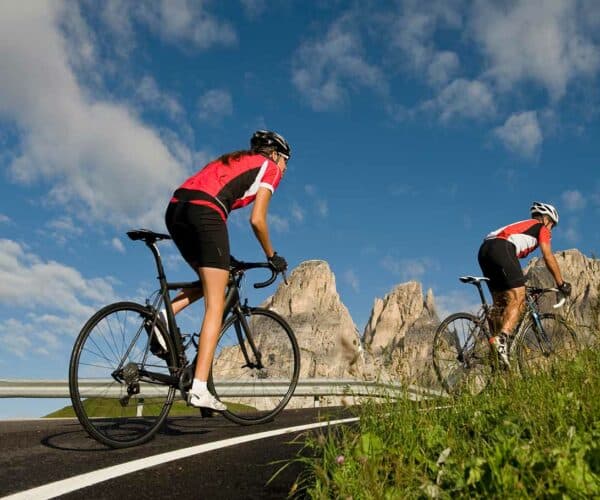Apart from the obvious – cycling on the other side of the road, when planning a cycling holiday in France, there are some sensible points to consider concerning the rules of the road. For your own safety and others, it’s important to be aware of the following French cycling laws and regulations to ensure your compliance with local rules.
Whether you’re following the trails of the Tour de France or cycling more low-level terrain, this guide will cover the main laws and rules for cycling in France, what the fines are if you break them and guidance as to what to do if you face an accident yourself.
Cycling Rules & Regulations in France

Cycling Infrastructure
France has an extensive network of cycling paths and designated routes known as “voies vertes” (greenways) and “véloroutes” (cycle routes). These paths are typically well-marked and provide safe and scenic routes for cyclists. It’s advisable to use these designated paths whenever possible to avoid cycling on busy roads.
Helmet Laws
In France, cyclists are not legally required to wear helmets when cycling, except for children under the age of 12. However, wearing a helmet is strongly recommended for safety, especially when cycling on roads or in urban areas.
Road Rules
Cyclists in France are subject to the same road rules and regulations as motorists. This includes obeying traffic signals, signs, and road markings, as well as yielding to pedestrians at crossings. Cyclists must also ride on the right side of the road and use hand signals to indicate turns or stops.
Lighting and Visibility
Cyclists riding at night or in low visibility conditions are required to have front and rear lights on their bicycles. Reflective clothing or accessories are also recommended to improve visibility to motorists and other road users. Fines range from €22 to €75 for non-compliance.
Alcohol and Drug Use
It is illegal to cycle under the influence of alcohol or drugs in France. The legal blood alcohol limit for cyclists is the same as for motorists, which is 0.5 grams per litre of blood (equivalent to 0.25 milligrams per litre of breath).
Bicycle Equipment
Bicycles used on public roads in France must be equipped with certain safety features, including working brakes, reflectors, and a bell or horn. Electric-assist bicycles (e-bikes) must comply with specific regulations regarding motor power and speed limits.
Passing and Overtaking
When passing pedestrians or other cyclists on shared paths, cyclists should give an audible warning and pass on the left side. When cycling on roads, cyclists should keep to the right and allow faster-moving vehicles to overtake safely.
Bicycle Theft Prevention
Bicycle theft is a common problem in urban areas and tourist destinations in France. It’s essential to use a sturdy lock to secure your bike when parking it in public places and consider storing your bike indoors overnight whenever possible.
Local Regulations
Cycling laws and regulations may vary slightly between regions or municipalities in France. It’s advisable to familiarise yourself with any local rules or restrictions that may apply to cycling in the specific area you plan to visit.
Mobile & Audio Devices
It is illegal to wear headphones or earphones in both ears while cycling. This means that cyclists are only permitted to use headphones or earphones in one ear while riding. The use of mobile phones while cycling is also regulated. Cyclists are prohibited from holding or using a mobile phone while riding. This includes making calls, texting, or using apps.
Do I need to wear a cycling helmet by law in France?

In France, cyclists are not legally required to wear helmets when cycling, except for children under the age of 12. However, it is common practice for adults to wear helmets and is strongly recommended for safety, especially when cycling on roads, in urban areas and in competitions. While there is no specific law mandating helmet use for adult cyclists, it’s essential to prioritise personal safety and consider wearing a helmet as a precautionary measure to reduce the risk of head injuries in the event of an accident.
What are the penalties in France for breaking cycling laws?
The penalties and fines for breaking cycling laws in France vary depending on the specific offense committed. While these are not an exhaustive list of penalties for every possible violation, here are some common cycling offenses and their associated fines or penalties in France. Fines vary from 10 euro to 135 euro.
Cycling Under the Influence
Cycling under the influence of alcohol or drugs is illegal in France. The penalty for cycling while intoxicated may include fines, confiscation of the bicycle, and potential suspension of the cyclist’s driver’s license if they hold one.
Ignoring Traffic Signals or Signs
Cyclists must obey traffic signals, signs, and rules of the road, just like motorists. Ignoring red lights, stop signs, or other traffic signals can result in fines and penalties similar to those imposed on drivers.
Riding Without Lights at Night
Cyclists riding at night or in low visibility conditions are required to have front and rear lights on their bicycles. Riding without proper lighting can result in fines and penalties, particularly if it contributes to an accident or poses a safety risk.
Cycling on Pavements or Pedestrian Areas
Cycling on the pavement or pedestrian areas where cycling is prohibited can result in fines or penalties. Cyclists must use designated cycling lanes or paths whenever available and adhere to local regulations regarding cycling on sidewalks or pedestrian zones.
Failure to Give Way to Pedestrians
Cyclists must yield to pedestrians at crosswalks and pedestrian crossings. Failure to do so can result in fines or penalties, particularly if it leads to a pedestrian accident or poses a safety risk.
Reckless Cycling Behaviour
Reckless cycling behaviour, such as speeding, weaving in and out of traffic, or endangering other road users, can result in fines, penalties, and potential legal consequences similar to those imposed on motorists for reckless driving.
Cycling Without Proper Equipment
Bicycles used on public roads in France must be equipped with certain safety features, including brakes, reflectors, and a bell or horn. Riding a bicycle without proper equipment can result in fines or penalties.
What to do if you have a cycling accident in France?

Prioritise Your Safety
Move to a Safe Area: If possible, move away from traffic to prevent further harm.
Stay Close to the Scene: Remain near the accident site for documentation purposes.
Assess Injuries and Document Details:
Check yourself and others for injuries.
Gather essential information:
Names and contact details of all parties involved.
Witness information (if any).
Vehicle details (if a motor vehicle was involved).
Photos of the scene, including road conditions, bike damage, and injuries.
Contacting Emergency Services
If anyone is injured in an accident, call emergency services immediately by dialling 112 in Europe. Provide details about the location of the accident, the number of people involved, and the nature of any injuries. Follow any instructions provided by emergency dispatchers and provide assistance to injured parties while waiting for help to arrive.
Additional Emergency Numbers in France:
15: Medical emergency (SAMU).
17: Police.
18: Fire and accident.
Accident Documents
European Accident Statement (Constat Amiable):
In most EU countries, including France, the police use an agreed statement of facts called the European Accident Statement. Complete this form immediately with the other party involved. It helps exchange information about the accident.
Key details to include:
Date and time of the accident
Location
Description of what happened
Vehicle details
Injuries sustained
If you don’t understand the form or disagree with the other party, do not sign it.
Get Cycling Travel Insurance with SportsCover Direct
Preparing for cycling abroad includes knowing about the countries rules and regulations to protect yourself as well as other people. Cycling Travel Insurance should also be part of your preparation.
Even if your cycling would be considered relatively low risk, taking out comprehensive insurance cover is so important. At SportsCover Direct, we provide affordable cycling insurance to riders of all levels of ability and experience, and all types and value of bikes. So, if you get injured while riding, injure someone else, suffer damage to your bike or equipment, or your cycling trip is disrupted, we can make sure you don’t end up out of pocket.
Our policies are available through flexible payment plans and start at just a few pounds a month. Take a closer look at our cycling insurance options today.
Bee Ingram
Content Writer for SportsCover Direct
This blog has been created as general information and should not be taken as advice. Make sure you have the correct level of insurance for your requirements and always review policy documentation.